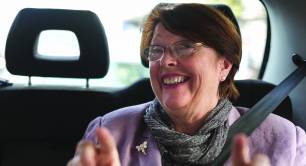Is social enterprise unconsciously biased against BAME women?
If you’re a woman (or know one) making a tangible difference in social enterprise, impact investment and mission-driven business, nominate for WISE100 2019 now!
Academic and social entrepreneur Dr Pragya Agarwal is passionate about bringing more women from BAME or marginalised communities into social enterprise. Speaking to attendees of NatWest’s WISE100 launch in 2018, she offered some suggestions for how to make this possible.
Pioneers Post could not have found a more relevant speaker for our NatWest WISE100 celebration than Dr Pragya Agarwal.
As an academic and journalist, Agarwal has dedicated her career to giving a voice to mental health issues, women’s empowerment and cultural diversity. She’s also the director of the 50 Percent Project, a think tank that studies the status of women around the world, as well as founder and CEO of The Art Tiffin, which sells cruelty-free, vegan art materials.
So, what did Agarwal have to say to the room full of changemakers gathered to celebrate the top 100 women in social enterprise?
Social enterprise: an exclusive club?
A high proportion of social businesses is led by women – which many people take as a sign of our sector's inclusivity. But embracing diversity means addressing more than just gender imbalances, said Agarwal, and those of us working in social enterprise need to take note of who we are excluding.
The social sector is often seen as something for “white, middle class” people, she told attendees, adding: “Are we giving out some kind of subliminal, unconscious messages that say social enterprise is not for BAME or marginalised communities and women?”
Referring to research from ethnic minority lobby group Voice 4 Change England, as well as her own experiences as a woman from India, she urged the audience to wake up to the fact that BAME and marginalised communities – and particularly the women from them – are often not reached by social enterprise networks and funding.
We think: ‘I don’t see a woman of colour running a social enterprise – so why should I be a part of that?
The power of role models
What should we do about this?
Speaking to Pioneers Post after the WISE100 launch, Agarwal suggested that one solution would be creating more platforms to promote visibility of non-white women in social enterprise.
“It’s important that we celebrate more role models, or how else will they know that it’s something in their reach?
“A lot of what we believe [we can achieve] ourselves comes from what we see and what we read in the media, and a lot of bias is created through that. We think: ‘I don’t see a woman of colour running a social enterprise – so what is that and why should I be a part of that?’
“Through celebrating these role models it becomes possible for somebody else, it sparks an idea.”
After the event, we talked to Dr. Agarwal about how we can empower more women in social enterprise. Listen to her full speech, followed by our interview, above.
P.S. This video is brought to you by Pioneers Post – a social enterprise set up to deliver great journalism to support social entrepreneurs, impact investors and mission-driven businesses. Good journalism like this costs money, and we rely on subscriptions in order to keep delivering the social enterprise news. Support us and stay updated: www.pioneerspost.com/subscribe



